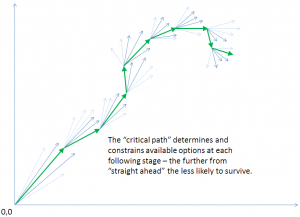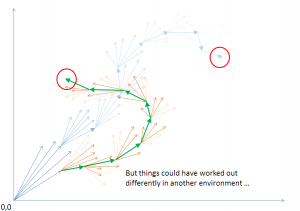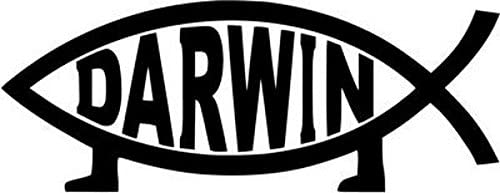Evolution by natural selection
|
The JC’S favourite Big Ideas™
|
“But if variations useful to any organic being do occur, assuredly individuals thus characterised will have the best chance of being preserved in the struggle for life; and from the strong principle of inheritance they will tend to produce offspring similarly characterised. This principle of preservation, I have called, for the sake of brevity, Natural Selection.”
- — Charles Darwin, On the Origin of Species, Chapter 4
Firstly, bad metaphor watch: be careful of using the word “evolve” when you mean “develop”. Evolution is the process of spawning and dying, and leaving it to the obstreperous gods of Earth, Wind, Fire and Water to figure out which, if any, of your progeny should survive.
Now, if you’re the COO of an established financial services organisation, we respectfully submit that throwing your infants unchaperoned into the mindless ravenous maw of nature to see how they get on while you shuffle off your mortal coil is not what you should be aspiring to put your organisation through. Evolving involves you dying, and the — ah — lion’s share of your children dying too, for the betterment of some unseen replicating subcomponent of the greater whole.[1] Dear COO: your job is to protect your firm from the red claws and teeth of nature, not to feed them.
How evolution works
In essence,[2] evolutionary theory is that organisms evolve through a mindless, iterative process — an algorithm. Each iteration has three components:
- Variation: Random but minor variations in organisms, which happen through recombination (mixing of parental genes) or mutation (errors in copying genes).
- Selection: Selection of those variations that are best suited to the prevailing environment — this will happen naturally; those variants that are less suited will, ipso facto, fare worse and eventually die out.
- Heredity: The features conferring fitness tend to be retained and passed on in successive versions of each reproducing organism. This happens through parental combination.
The process is one of “trial-and-error” or “generate-and-test”: The problem is how best to survive and replicate in the given environment; the “best” solutions for the process continuously generate new trials, test them, discard failures, and keep the successes.


Observations on the evolutionary process
- It is blind, and therefore profoundly stupid: It requires no insight, intelligence or imagination. While the inputs are complex and unpredictable, the steps followed are simple, and algorithmic. It is suitable for a Turing machine. It requires no educated guesses, no knowledge of the environment or the laws of physics. But by the same token, it cannot retrospectively correct variations which were successful but which, on subsequent adaptations, have turned out to be constraints or design flaws. You need intelligence for that. Thus the argument that evolution proves that algorithms can solve any problem is a canard.
- It is profoundly wasteful: It operates on the basis of trial and error, but because it is stupid, it is entirely unsupported by intelligent insight. It cannot hypothesise that variation x will be more successful than variation y, and so opt for variation x.
- It is profoundly inefficient: the iterative nature of the evolutionary process is highly unlikely to produce design economy: Each new adaptation depends on, and is layered on top of, all earlier adaptations. The more more recent an adaptation is, the more susceptible it is to successful mutation. Mutations in basic characteristics on which a lot of subsequent bio-engineering depends are likely to be catastrophic. A design flaw that is critical will lead to extinction. A non-critical design-flaw may be that layering work-arounds over earlier design flaws, but there is no mechanism in evolution (other than fiat) to “improve” an underlying design.
- It is path-dependent: Where any step can go depends on where you start and what are the prevailing environmental conditions. The further back down the chain you go,the more divergent subsequent paths can be. This means it is survivor bias writ large, and also that:
- It is profoundly contingent: “fitness” depends not just on the organism’s own adaptations, but the changing environment, which comprised:
- (a) the organism itself;
- (b) all other (evolving) organisms in the biosphere; and
- (c) changing climate, whether through:
- (i) normal environmental fluctuations (weather, seasonal change, viruses);
- (ii) evolving organisms consuming resources and competing with each other; or
- (iii) extraordinary climactic events (earthquakes, volcanoes, meteorites, invasions of “aliens”).
The contrarian piece
Now, that out the way, try this. Evolution by natural selection — Darwin’s dangerous idea — is the greatest of all scientific achievements — or not science at all?
Let’s see if this works. A scientific theory must tell us something about the world: it must make a prediction that does not follow as a matter of irrefutable logic, that could, in theory, be false — thereby cutting down the number of possible outcomes, and making those that remain more predictable. It must be, in Karl Popper’s argot, falsifiable. Not false, but able to be false. F= M*A is a “synthetic statement”. You need evidence to support it. It is “falsifiable”, because an outcome where force does not equal mass * acceleration is possible. Indeed, Einstein found some examples. By contrast, 2 + 2 = 4 is not falsifiable: it is true by definition — it is an analytic statement. For 2 + 2 not to equal 4 would mean changing the meaning of “2”, “plus”, or “4”. Assuming we are using mathematical notation correctly, 2=2=4 is a priori true. In this way, mathematics may be the language of science, but it is not science itself.
Now, in which camp does the theory of evolution by natural selection fall? If is falsifiable? Patrick Matthew who first discovered it, before Charles Darwin, thought not. Responding to Darwin’s gracious concession of his priority, Matthew said:
“To me the conception of this law of Nature came intuitively as a self-evident fact, almost without an effort of concentrated thought. Mr. Darwin here seems to have more merit in the discovery than I have had; to me it did not appear a discovery. He seems to have worked it out by inductive reason, slowly and with due caution to have made his way synthetically from fact to fact onwards; while with me it was by a general glance at the scheme of Nature that I estimated this select production of species as an a priori recognisable fact— an axiom requiring only to be pointed out to be admitted by unprejudiced minds of sufficient grasp.”[3]
If there is any kind of ongoing competition for resources, and participants in that competition replicate themselves with minor variations, and those variations alter the succeeding replicant’s fitness at competing for the resources it needs, then those variations which increase the replicant’s fitness will survive more frequently than those with variations which do not, over time the community will change in the direction of that “fitness”.
This seems to be just as analytic as the mathematical statement: the hidden tricksiness is in the notion of fitness. That’s where the hard work is done; that is where all the synthetic work sits. What counts as “fitter”? How do we predict that? On this, evolutionary theory has nothing to say. It doesn’t predict where organisms are going next; it merely gives an account of how they got to where they are now. Its only prediction is “it is highly unlikely that organisms won’t continue to evolve somehow”.
Sexual selection
The yang to natural selection’s yin, and the thing that perhaps more than anything else leads to muted cries that the theory of Evolution may be not so much universal acid as universal arse.
For natural selection says that all variations are selected for environmental fitness. This, you would think, stands to reason (is a priori true); for if it were not, and a variation that prejudiced one’s environmental fitness could sometimes win out in the genetic lottery, then the reliable algorithm of incremental, and inevitable, improvement of a species’ capacity to cope with prevailing conditions would be, in a word, buggered.
A successful variation which prejudices a species’ ability to survive and replicate, would falsify the theory of evolution by natural selection, you would think.
Yet, this is exactly what sexual selection purports to do: explain the prevalence of “peacock’s tails” in the genetic record — biological adaptions which confer no survival benefit at all, and indeed, seem to make survival harder. Such as a male peacock’s tail.
There is a theory that the client alert has survived in the great ecosystem of ideas, despite it being read by absolutely no-one except the poor sod commissioned to put it together, and his supervising associate, by dint of some kind of analogue to sexual selection.
See also
References
- ↑ Though, come to think of it, what — or who — might that be?
- ↑ See https://en.wikipedia.org/wiki/Universal_Darwinism
- ↑ PArtick Matthey, writing to the editor of the Gardeners’ Chronicle — seriously — May 12, 1860.
